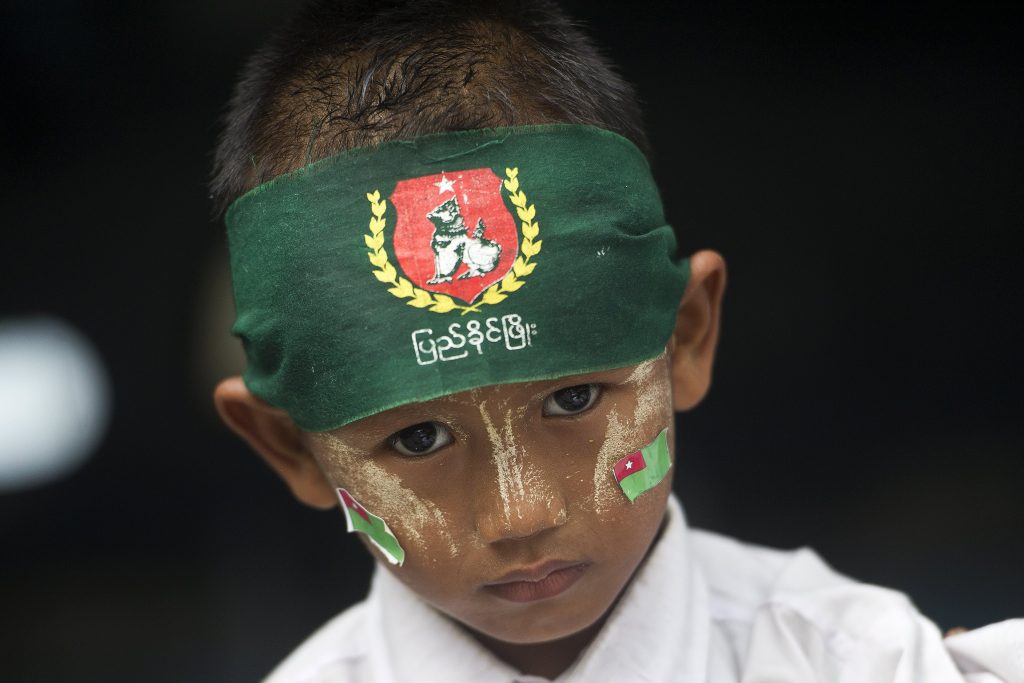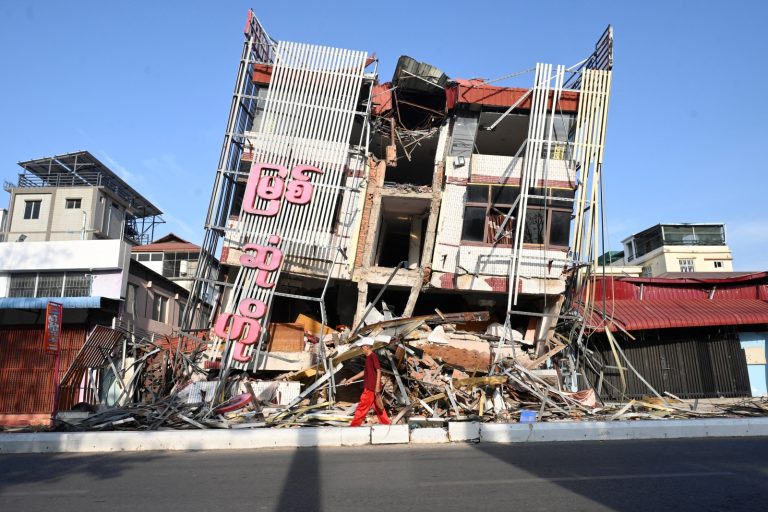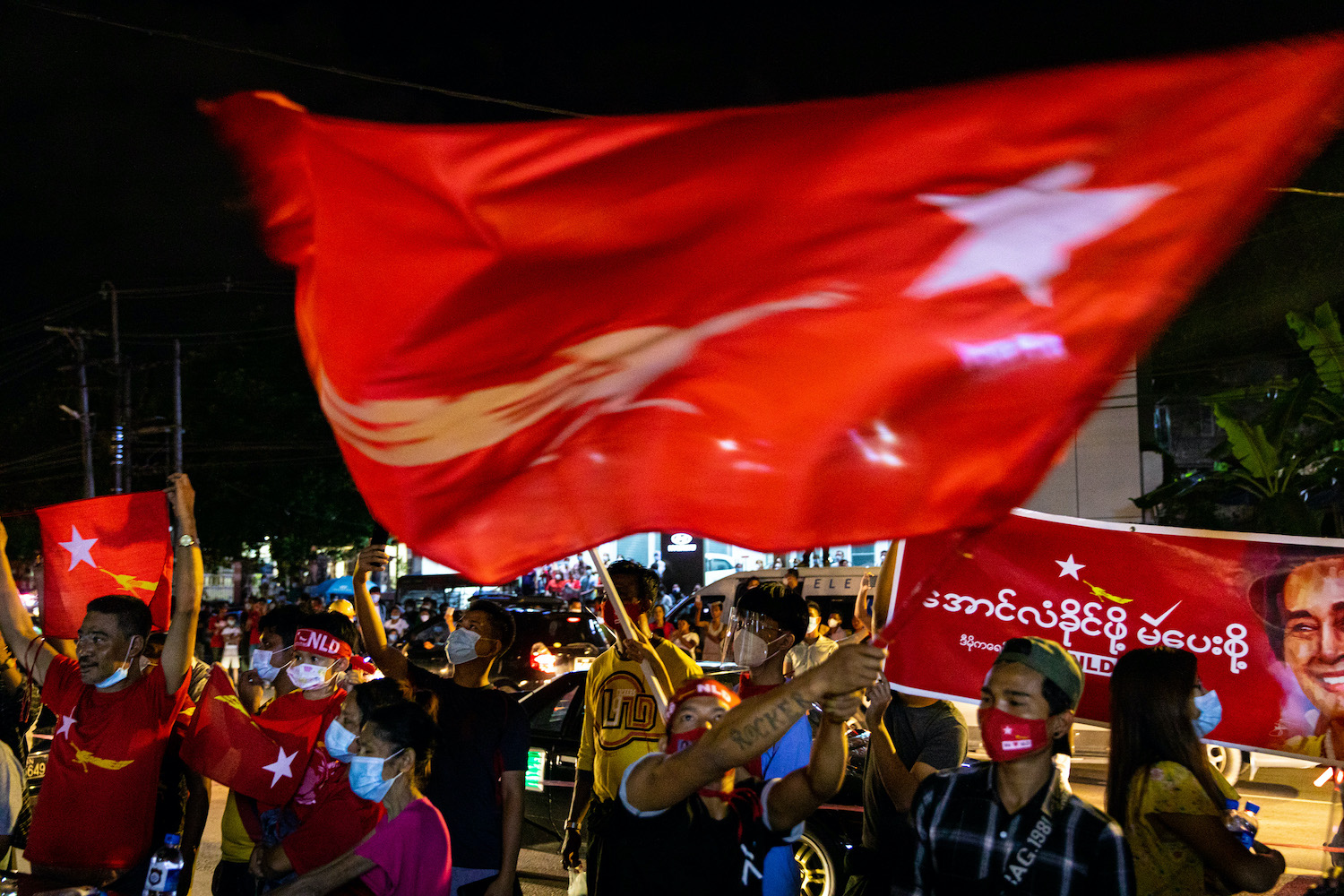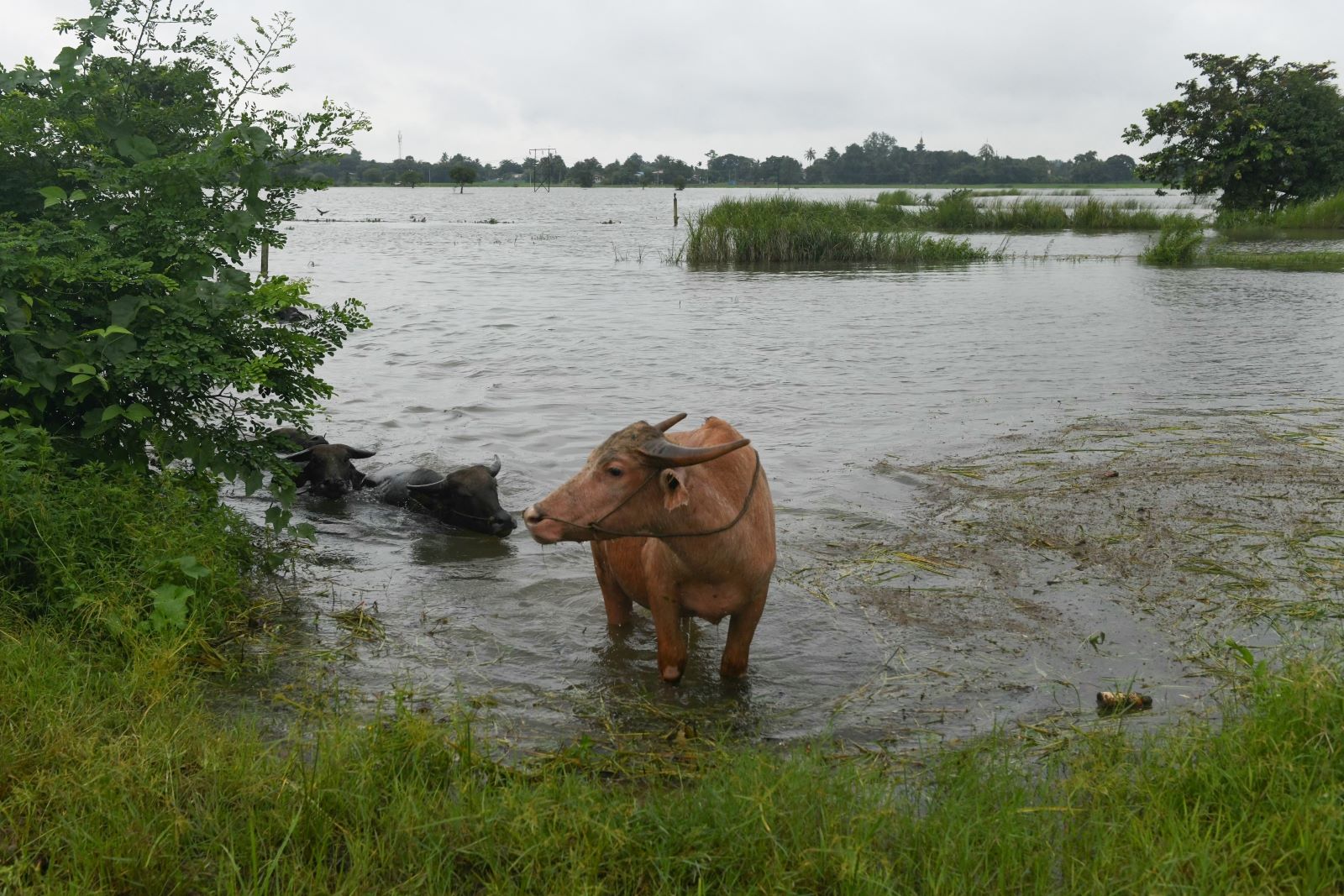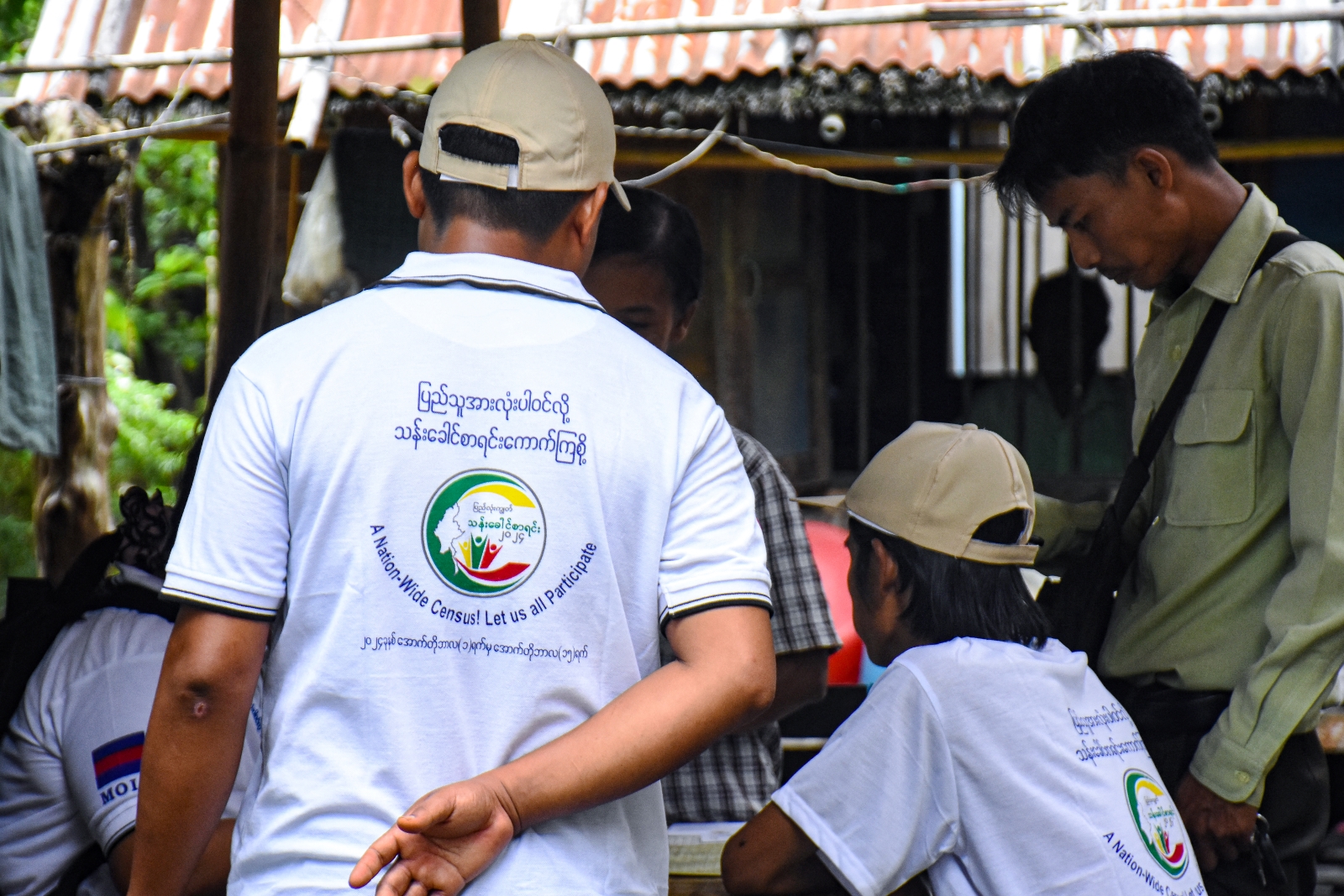Buddhist nationalism and a focus on rural voters helped the military-backed Union Solidarity and Development Party retain a rare stronghold in southern Mandalay Region, but cracks are emerging ahead of this year’s vote.
By SWE LEI MON | FRONTIER
September 2 was like any normal, noisy weekday in the Dry Zone town of Meiktila – but with one difference. Many of those browsing the municipal market or driving the streets were wearing red t-shirts bearing the fighting peacock and five-pointed star of the National League for Democracy. NLD-branded facemasks also abounded, and motorbike drivers brandished NLD flags as they crossed the bridge over Meiktila Lake built by the former Union Solidarity and Development Party government in 2015.
This demonstration of support for the NLD, which largely took the form of residents donning party merchandise as they went about their day, was arranged on social media and took place six days before NLD chair Daw Aung San Suu Kyi officially launched the party’s campaign at a ceremony in Nay Pyi Taw.
Similar outpourings of support for the ruling party have been seen across Myanmar in recent weeks – at least outside of ethnic minority areas – but in Meiktila it carried greater significance. Though the town is firmly within the central Bamar heartland, which overwhelmingly voted for the NLD in the 2015 general election, Meiktila was one of four neighbouring townships of southern Mandalay Region that remained loyal to the then-ruling USDP.
That year, the military-aligned party won the Amyotha Hluttaw seats of Mandalay-11, encompassing Meiktila and Mahlaing townships, and Mandalay-8, which covers Pyawbwe and Yamethin. The USDP also took all the Pyithu Hluttaw and regional assembly seats corresponding to Meiktila, Pyawbwe, Yamethin and Thazi. In all these races, the USDP candidates got more than half the vote, beating the runners-up from the NLD with victory margins that peaked at 23 percent in the case of the Pyithu Hluttaw seat for Meiktila.
Meiktila, Pyawbwe, Yamethin and Thazi are consequently referred to as pyi khaing phyo myo lay myo (“the four USDP towns”). Viewed on a map of election results from 2015, they together form an island of green in a vast red sea.
However, during a visit to these townships in late August and early September, Frontier found that far from being an impregnable stronghold of the military-linked opposition, the island of green looked vulnerable to being submerged in the November 8 vote.
Buddhist nationalist groups, seen as key contributors to the USDP’s success in the area in 2015, have been suppressed under the NLD government and struggle to organise openly. The NLD also seems to have learned from its neglect of rural voters in these townships in 2015 and will prioritise them while campaigning. However, Frontier also found that, on closer inspection, Buddhist nationalism remains influential in villages, and the USDP’s wealth has allowed the party to preserve its patronage of poor rural communities.
Altogether, this corner of the Dry Zone is emerging as a rare site of competition between Myanmar’s two major parties, in an election where another nationwide NLD victory is considered a foregone conclusion.
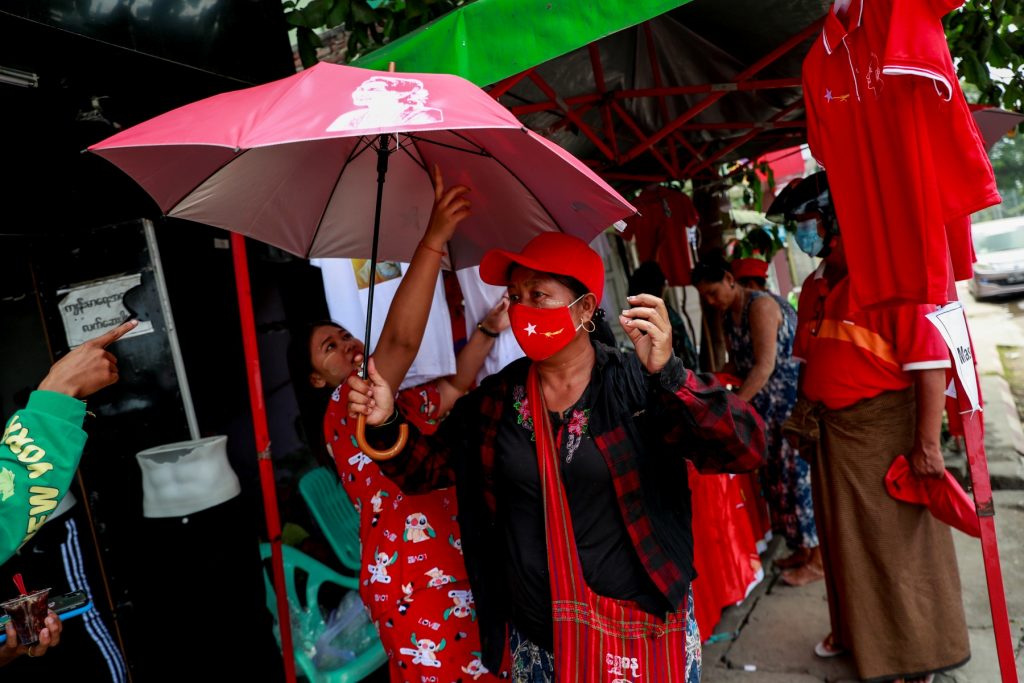
A legacy of violence
Although a range of parties are competing in the four “green” townships, residents unanimously told Frontier that only the NLD and the USDP are in with a chance. “The election is a battle between the NLD and the USDP; no other party is well-known in our township,” said U Khin Nann, a former 88 Generation student activist living in Meiktila.
The intensity of this “battle” in Meiktila Township was illustrated by a brawl between NLD and USDP supporters in the village of Nyaung Kaing on September 20. USDP members allege that NLD supporters interrupted their campaign event in the village. Rocks were thrown at the home of an NLD affiliate in retaliation, and several USDP campaigners were arrested.
The NLD had gained a foothold in Meiktila in the 2012 by-elections when U Win Htein, a close confidante of Aung San Suu Kyi, was elected to the Pyithu Hluttaw by voters in his hometown. The loss of this foothold in 2015, when the USDP swept all constituencies in Meiktila, was widely ascribed to the politics of Buddhist nationalism.
The electoral race in the township was poisoned by the aftermath of an orgy of communal violence in March 2013 that left more than 40 Muslims dead and thousands homeless. The dead included 36 boys and teachers slaughtered at an Islamic boarding school.
The NLD’s fate in 2015 was believed to have been sealed by comments made by Win Htein, who chose to sit out the election that year to focus on high-level party organisation. The NLD stalwart said in August 2013 that the violence earlier in the year made him “ashamed to be from Meiktila”. This infuriated Buddhist nationalists in the town, who launched a failed attempt to have him removed as an MP.
The March 2013 violence in Meiktila shattered what harmony there had been between the Buddhist and Muslim communities in the town and surrounding area. This provided fertile ground for Buddhist nationalist groups such as the now-banned Association for the Protection of Race and Religion, better known by the acronym Ma Ba Tha. The inroads made by this monk-led group ensured that religion had a prominent role in the local election campaign, and Ma Ba Tha campaigned more or less openly against the NLD.
The NLD’s Dr Khin Soe, who was defeated by the USDP’s U Soe Than in the race for the regional assembly seat of Meiktila-2 in 2015, said voters brainwashed by religious nationalism was one of the reasons why the NLD failed to win seats in Meiktila. Some political parties had exploited religion for political gain, he said, and not just the USDP.
“It is obvious because Daw Khin Waing Kyi of the National Democratic Force party, a famous ally of Sayadaw Wirathu of Ma Ba Tha, came to Meiktila to contest the Pyithu Hluttaw seat with the objective of splitting the vote,” Khin Soe told Frontier.
The NDF was formed by breakaway members of the NLD who wanted to compete in the 2010 general election, against the NLD’s boycott of that vote. Despite the party’s background in the democracy movement, senior member Khin Waing Kyi had advocated in favour of the four so-called “race and religion laws” during parliamentary debates. These laws, proposed by Ma Ba Tha, were passed by the USDP-dominated parliament in August 2015.
However, the NLD did not lose in Meiktila because of vote splitting. Khin Waing Kyi’s 3pc vote share added to the NLD candidate Dr Win Soe Oo’s 36pc was still well under USDP candidate Dr Maung Thin’s 59pc. Nonetheless, Khin Soe said NDF members undermined the NLD with negative campaigning, along with other anti-NLD elements who told villagers that if the party formed government, “the country will be a kalar country”, using a pejorative term for those of South Asian descent, particularly Muslims.
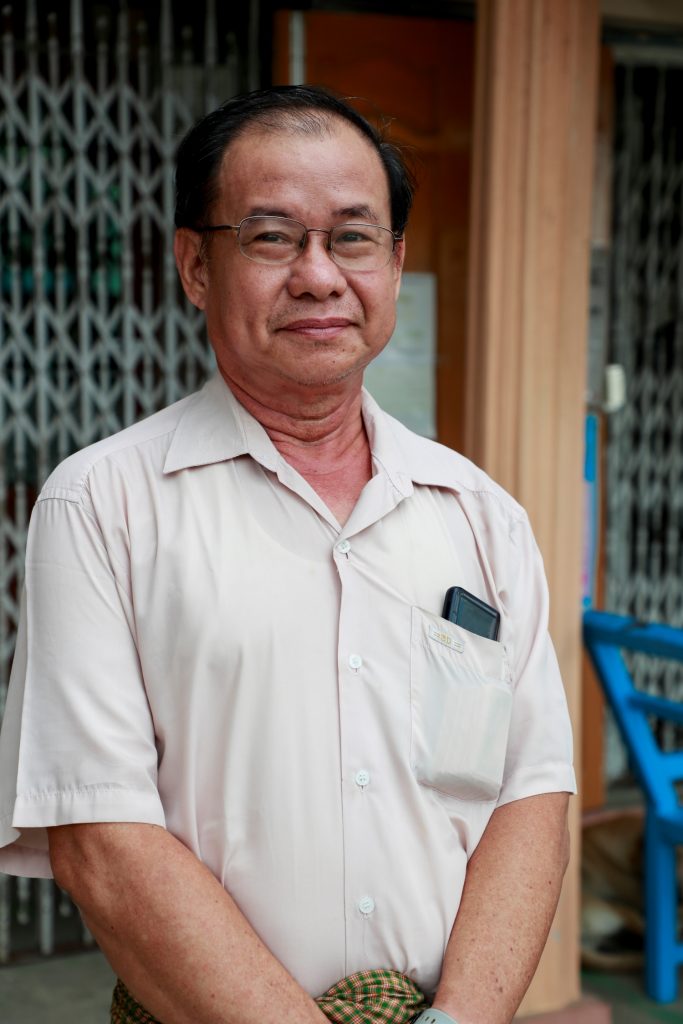
‘Race and religion’
The other three townships in the USDP’s southern Mandalay Region stronghold – Pyawbwe, Yamethin and Thazi – are also considered redoubts of Ma Ba Tha and related nationalist groups.
The rioting in Meiktila in March 2013 spread to other towns, including Yamethin, where mosques and dozens of Muslim homes were destroyed. With Buddhist-Muslim relations still strained from the violence, Yamethin’s Thilawa Hall hosted one of a string of victory rallies held by Ma Ba Tha during the 2015 election campaign period to celebrate the passage of the “race and religion” laws. Yamethin residents described to Frontier how up to 30,000 people, largely from rural villages in the township, crammed into the hall and spilled into the outer compound in order to hear a sermon by Wirathu, who is one of Buddhist nationalism’s fiercest proponents in Myanmar.
After the election, losing NLD candidates took two of the new USDP lawmakers to a Union Election Commission tribunal, alleging that the USDP victors had inappropriately taken part in this Ma Ba Tha rally and otherwise colluded with nationalist monks to sway voters. The tribunal agreed, annulling the MPs’ victories and handing the Pyithu Hluttaw seat of Yamethin and the regional assembly seat of Yamethin-2 to the NLD runners-up.
Electoral law forbids “using religious symbols” and campaigning “based on religion”.
U Kyaw Myint, who had to forfeit his seat of Yamethin-2, denied that he had participated in the event at Thilawa Hall or been involved with Ma Ba Tha. He told Frontier that he had never even met Wirathu, who went into hiding in June last year after being charged with sedition, under section 124(a) of the Penal Code, for ridiculing the government.
“The UEC’s orders were not fair,” Kyaw Myint said. “It said we had a responsibility to restrict the victory celebrations for the ‘protection of race and religion’ laws. But this was not possible because the celebrations were held by Ma Ba Tha, not us.”
Daw May Zin Thant, aka Amay Htway, is an interfaith activist who works for the Yamethin Township branch of the Peace Forum Network, an initiative established under Myanmar’s peace process. She said there was no doubt Buddhist nationalism was the main reason the NLD lost in the four southern Mandalay Region townships in 2015.
May Zin Thant explained that because villagers in the township did not have sound religious knowledge, they were made to believe that an NLD government would be a threat to the future of Buddhism in Myanmar.
She said the situation had not improved much and “education about religious matters is not reaching the villages”, partly because of official obstruction. “Although we are able to do interfaith workshops in the town, it’s difficult to get permission from the authorities to do training in the villages,” she told Frontier.
This opens the door to religion again being exploited for political gain. The NLD’s chair in Pyawbwe, U Aye Cho, said the USDP was continuing to use religion as part of its election strategy. “If they go to a village, the first place they visit is the monastery. They donate many things to the monks and, as you know, monks are the most powerful people in villages,” Aye Cho told Frontier.
The country’s peak monastic authority, the State Sangha Maha Nayaka Committee, ordered Ma Ba Tha to dissolve in 2017, and it issued the same order to Ma Ba Tha’s rebranded organisation, the Buddha Dhamma Parahita Organisation, the following year. However, most senior monks who had been members of the organisation remain as abbots of monasteries in villages in Pyawbwe Township, said local Peace Forum Network members.
A resident of one of the township’s villages, who asked that his name not be used out of concern for his safety, said he had stopped attending the village monastery because the monks were always promoting nationalism. “I don’t want to go there because the abbot is giving sermons about nationalism and politics and I don’t like it,” the man told Frontier.
Pyawbwe-based activists and NLD members welcomed the outlawing of Ma Ba Tha and other ultra-nationalist groups – but this opinion is not shared by the Pyithu Hluttaw MP for Pyawbwe, U Thaung Aye of the USDP.
The former Tatmadaw lieutenant-general said protecting amyo, batha, and sasana (race, religion and the Buddha’s teachings) is the responsibility of any Buddhist. However, he rejected the suggestion that the USDP’s local victories in 2015 were won with the aid of Ma Ba Tha. The piety of most residents, he told Frontier, meant it was natural for them to vote for a party like the USDP that promised to protect traditional Buddhist values.
“Buddhism is a religion that is deeply rooted in this area, and there are many people who practise Buddhism, which is why the teachings of monks in this area have reached the hearts of the villagers,” Thaung Aye said. “Villagers chose the right people in 2015 by exercising their own judgement.”
He added that his party’s affiliation with the Tatmadaw, which is considered the USDP’s main liability elsewhere in Myanmar, is actually part of its appeal in Pyawbwe. The area had been lawless in the years following independence from British rule in 1948, he said, until the military restored order, and this memory still motivates local people to vote for the party that the military created. “It’s way of showing their thanks to the Tatmadaw.”
Sayadaw U Ottara, the former chair of Ma Ba Tha in Meiktila, denied that he and other monks were steering voters towards the USDP. He said he merely urges his congregation to vote for any party that protects Buddhism. “I don’t tell the people which party to vote for, but I do urge those who seek my advice to choose those who are actively working for our religion,” Ottara told Frontier. “People criticise us for being close to the USDP, but as we are monks we have to accept donations from everyone.”
The NLD’s Aye Cho said that despite the lingering influence of Buddhist nationalism, the outlawing of Ma Ba Tha had made it much harder for nationalist monks to organise openly and he believed this would work to his party’s advantage this year.
He was also more optimistic than May Zin Thant that Buddhist nationalists would not be able to exploit the people as easily as they did in 2015. He said this was because greater internet access in the villages during the past five years had made them shrewder at detecting fake news and hate speech aimed at stirring up religious feelings – contrary to the popular view that access to social media has exacerbated divisions.
However, some residents remain concerned that hardline nationalists will become active again as election day nears, and point to recent, covert signs of a revival.
Ma Thi Thi Mar, who works for the Peace Forum Network in Pyawbwe, said that in late June, VCDs of Wirathu’s sermons were distributed overnight in Pyawbwe town along with leaflets that urged voters not to support the NLD. She said officials had confiscated the materials and the police investigated, but “nobody knows who’s responsible”.
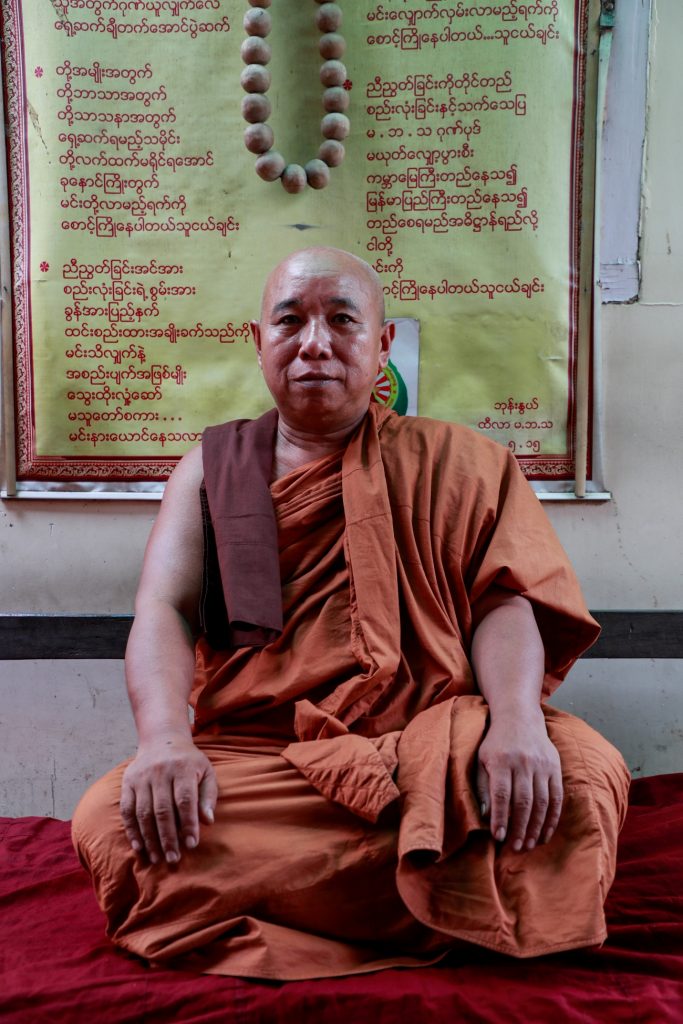
The crucial countryside vote
Although an atmosphere of heightened Buddhist nationalism undoubtedly posed a problem for the NLD in 2015, it also obscured flaws in the party’s campaign strategy in the area, say local activists who spoke to Frontier. Chief among these flaws was a failure to prioritise rural voters, who outnumber the urban electorate.
The 2014 census found that Meiktila Township had a population of nearly 310,000, of whom more than 60pc lived in villages outside of the hub town of Meiktila. The rural population was much higher in Pyawbwe, Yamethin, and Thazi, which had urban populations of just 12.4pc, 10.7pc, and 10.1pc, respectively.
The Meiktila-based former 88 Generation activist Khin Nann, who supports the NLD, said the party ignored advice in 2015 that it needed to eschew the town, where it already enjoyed solid support, and campaign heavily in the villages. “We advised it to focus on the villages because people in the towns were going to vote for the NLD anyway,” he said. “The NLD won in 2012 because it listened to us, but it did not listen to us in 2015 because it was too confident.”
Khin Soe admitted that the NLD seldom campaigned in villages in the area in 2015 and had lost heavily at polling stations in rural areas. “We won most of the polling stations in the town, but we failed because of the rural vote and the military vote,” he said, referencing Meiktila’s status as a Tatmadaw hub and the near unanimity with which armed personnel across Myanmar voted for the USDP.
During Frontier’s recent visit, the Meiktila Township election sub-commission said there are currently about 13,000 Tatmadaw members and dependents among more than 240,000 eligible voters. Sub-commission chair U Zaw Win said that out of 291 polling stations in the township, 15 had been prepared for the exclusive use of Tatmadaw personnel and family members – who will be voting outside military cantonments for the first time – and three for both military families and civilians.
If the race in Meiktila is close this November, these military votes could be decisive. However, they did not explain the NLD’s loss in 2015, because the USDP candidates in the township won with margins that exceeded the total number of military votes.
Khin Soe said the USDP that year had “beautifully” employed a strategy of campaigning with the assistance of village tract administrators, who would convene entire communities whenever USDP candidates or officials visited.
The USDP may not be able to rely on these administrators this year, especially given that the General Administration Department, under which these administrators serve, was moved from military control to a civilian ministry in late 2018.
U Htein Min Khaing, a Meiktila-based member of civil society group 88 Generation Peace and Open Society, said the USDP had reaped dividends from its rural strategy in 2015, which he said had allowed the party to take advantage of the low political literacy among countryside voters. “The USDP did not focus on urban communities because people in the city are better informed and use the phone, watch television and follow the news,” he said.
The NLD seems to have learned its lesson by paying more attention to rural voters this year, and the party may also be able to use incumbency in the central government to its advantage. The NLD’s Aye Cho said the party had been able to build a better relationship with villagers in Pyawbwe Township during the past five years because of the NLD government’s contributions to local development. “Before 2015, only 98 villages had electricity,” he said, out of 317 in the township. “But nearly 200 villages have received power since the NLD took office.”
USDP candidates, meanwhile, said they maintain constant contact with villagers.
Mandalay Region Hluttaw MP U Myint Soe (Pyawbwe-2), who is seeking re-election on November 8, said his strong bond with the electorate meant he was not worried about competition. “I don’t even need to campaign during the official period set by the UEC. I am not being over-confident; I have been meeting my constituents regularly during the past five years,” the lawmaker, who is a prominent local businessperson, told Frontier.
Pyithu Hluttaw MP Thaung Aye said he had visited every one of Pyawbwe Township’s 317 villages. “When I return from Nay Pyi Taw on weekends I go to the villages and have visited some again and again,” he said, adding, “I always give my phone number to villagers.”
However, when Frontier questioned 12 people from Pyawbwe town and three of the township’s villages, only two could name their MPs. Thaung Aye said this was because the villagers are not interested in politics and are focused on their livelihoods.
The USDP’s Kyaw Myint, who is seeking to win back the seat of Yamethin-2, which he was forced to forfeit by the UEC tribunal, said he was not the type of candidate who only met constituents during election campaigns and had visited more than 120 villages. Frequent contact with rural voters meant that the USDP candidates know which villages need water or projects to improve agriculture, he said.
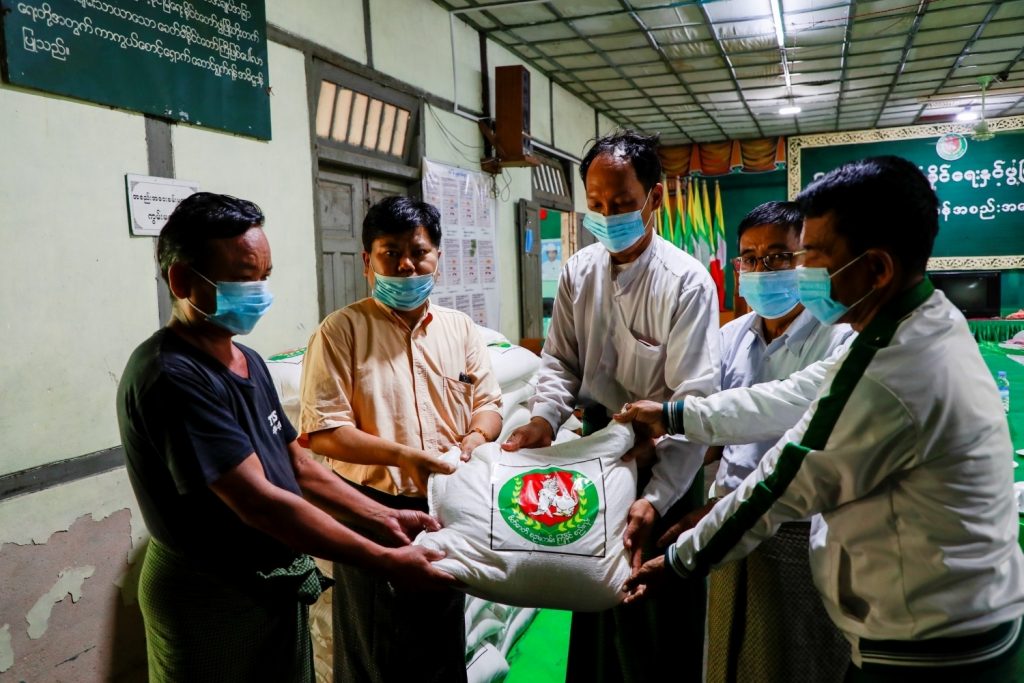
Donations, votes and COVID-19
The NLD and civil society groups say the close bonds with rural voters that USDP members boast about are greased with donations to villages and monasteries. They say that this largesse not only borders on vote buying, but also corrupts the broader electoral process.
Some villagers have come to expect cash handouts during election campaigns, said Thi Thi Mar from Peace Forum Network in Pyawbwe. “Some people ask party candidates who come to their villages how much are they going to give,” she said. “Some say they will vote for the party that donates goods or money.”
The economic crisis caused by the COVID-19 pandemic, and the lack of resources for tackling an outbreak of the disease, provided opportunities for parties to justify handouts to local people before the official start of the election campaign period on September 8.
Kyaw Myint of the USDP said members of his party have been visiting villages and giving donations to low income households since the first COVID-19 cases in Myanmar were reported in March. “We visited villages and provided awareness about the pandemic,” he said, adding that the party had also given out masks and soap to villagers.
On August 28 Frontier observed the USDP in Yamethin donating rice from the party’s township office to several hundred people, including manual labourers and their families and women running stalls at the municipal market.
“We donate a bag of rice to each person,” Kyaw Myint told Frontier at the donation event. “Yesterday, we provided meals to 67 families in Shwe Pyi Thar ward, and we are preparing to give donations to people affected by flooding.”
Ko Wai Linn, a manual labourer who received rice at the August 28 event, said he would vote for the party that paid attention to the struggles of working people. He said that the township’s current NLD lawmakers, who were installed by the post-election tribunal, had not kept in touch with residents over the last five years, but their USDP predecessors had.
Aye Cho of the NLD said his party could not hand out donations like the USDP because it lacked the funds.
USDP MP Thaung Aye admitted that his party had been well-funded since it was established in 2010 but denied that USDP candidates were trying to influence voters by donating to villagers and monks. He said these donations were often a question of good manners and social obligation. “I don’t want to visit monks empty-handed because I’m a Buddhist,” he said. “I like making donations but I do not expect anything from them.”
USDP members also point out that there is nothing stopping people who receive the USDP’s aid from voting for another party on election day. Candidate Kyaw Myint joked that this had happened throughout the history of Myanmar elections. “After the AFPFL [Anti-Fascist People’s Freedom League] split in 1958, U Kyaw Nyein offered donations in Yamethin, but the people voted for U Nu,” he said, referring to the 1960 election.
However, Thi Thi Mar of the Peace Forum Network worried that because rural voters were generally straightforward, honest people, “most of them think they should vote for people who give them donations”.
“Parties,” she said, “should not exploit the honesty of rural people.”
Correction: An earlier version of this article said that former National Democratic Force MP Daw Khin Waing Kyi had proposed the four “race and religion” laws in 2015. She did not propose them but advocated for their adoption in parliamentary debates.


